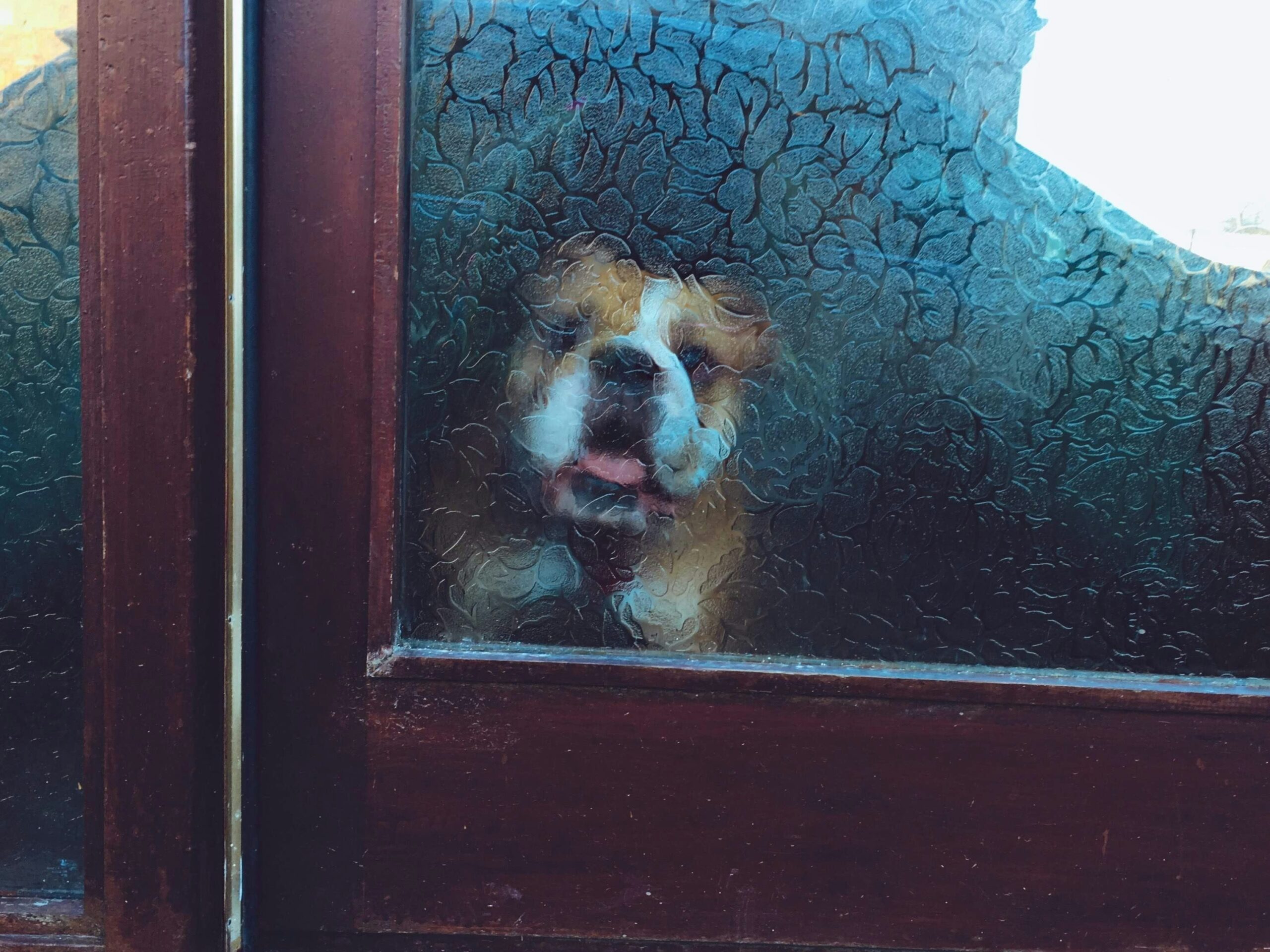Many dog owners have faced the challenge of a pup with a penchant for door scratching, and the good news is that there are effective solutions to curb this behavior.
From understanding the reasons behind the scratching to implementing simple yet impactful changes, we’ll walk you through a variety of techniques to restore peace to your nighttime routine.
Your sleep is essential, and so is your dog’s comfort.
By taking the time to address this common behavior, you can create a harmonious environment for both you and your beloved canine companion.
So, let’s dive into these 13 tips on How to Stop Your Dog from Scratching the Door at Night, explore the reasons behind door scratching, and equip you with the knowledge needed to enjoy quieter, more restful nights together.
Table of Contents
Peaceful Nights: How to Stop Your Dog from Scratching the Door at Night

1] Understanding the Urge
Embark on a journey to understand why your dog is scratching the door.
Scratching behavior can be driven by various factors, such as anxiety, boredom, or the need to relieve themselves.
Observe the circumstances surrounding the scratching incidents.
If it occurs primarily at night, it might be a response to anxiety or a call of nature.
Identifying the root cause is the first step in addressing the behavior effectively.
2] Establish a Consistent Nighttime Routine
Dogs thrive on routine, and establishing a consistent nighttime routine can help alleviate anxiety associated with door scratching.
Create a calming pre-bedtime ritual, such as a short walk or quiet play, to signal that it’s time to wind down.
Consistency in the routine provides predictability, helping your dog feel secure and reducing the likelihood of restlessness leading to scratching.
Tip: “Incorporate a calming pre-bedtime activity, signaling that it’s time to wind down.”
3] Comfortable Sleeping Space
Ensure your dog has a comfortable and inviting sleeping space.
Invest in a cozy dog bed that suits their size and preferences.
Add familiar blankets or bedding with their scent to make the designated area irresistible.
Introducing a calming scent, such as lavender, can further enhance the appeal of their sleeping space.
4] Plenty of Daytime Exercise
A tired dog is a content dog.
Ensure your furry friend gets plenty of exercise during the day to reduce excess energy and minimize the likelihood of nighttime restlessness.
Regular walks, play sessions, and mental stimulation activities contribute to a more relaxed demeanor at night, reducing the urge to engage in door scratching.
• A tired dog is a content dog • Ensure plenty of exercise during the day to reduce excess energy • Regular walks, play, and mental stimulation lead to a more relaxed demeanor • Minimizes the likelihood of nighttime restlessness and door scratching
5] Interactive Toys
Leave interactive toys or puzzle feeders for your dog to enjoy during the night.
These engaging distractions not only keep them occupied but also redirect their attention away from the door.
Choose toys that dispense treats or require problem-solving, providing mental stimulation and preventing boredom-related scratching behavior.
6] White Noise or Music
Create a soothing ambiance by playing white noise or calming music.
This can help mask external sounds that might trigger your dog’s desire to scratch the door.
The consistent background noise creates a more serene environment, minimizing disturbances that could contribute to anxious behaviors.
Tip: “Mask external sounds that trigger door scratching, fostering a tranquil environment.”
7] Positive Reinforcement
Acknowledge and reward calm behavior.
If your dog remains quiet and relaxed at night, offer praise, treats, or gentle affection to reinforce the positive behavior.
Positive reinforcement builds a connection between desired actions and positive outcomes, encouraging your dog to associate quiet nights with positive experiences.
8] Avoid Punishment
Avoid punishing your dog for scratching the door.
Punishment can escalate anxiety and worsen the behavior, potentially leading to more significant issues.
Instead, focus on positive reinforcement to foster trust and create a secure environment.
Encouraging positive behaviors helps build a stronger bond between you and your dog.
Tip: “Punishment may escalate anxiety; instead, create a secure environment for your dog.”
9] Use a Doggy Door
Consider installing a doggy door if feasible.
This allows your dog to go in and out independently, minimizing the need for door scratching to signal their desire to move around.
A doggy door grants them the freedom to access outdoor spaces, reducing confinement-related stress that may lead to scratching.
10] Safe Chew Toys
Provide safe chew toys in your dog’s sleeping area.
Chewing is a natural behavior that can help soothe anxiety and keep your dog occupied without resorting to door scratching.
Choose durable and appropriate toys that capture your dog’s interest, providing a positive outlet for their natural chewing instincts.
Tip: “Chewing is a natural behavior; redirect the urge away from the door with suitable toys.”
11] Calming Lavender
Lavender is known for its calming properties.
Consider using a lavender-scented diffuser or placing lavender sachets near the door to create a tranquil environment.
The soothing aroma of lavender can have a calming effect on dogs and contribute to a relaxed atmosphere, potentially reducing the inclination to scratch the door.
12] Consult with a Vet
If scratching persists, consult with your veterinarian to rule out any underlying health issues contributing to the behavior.
Sometimes, discomfort or pain may manifest as restlessness, leading to door scratching.
A thorough veterinary examination can help identify and address potential health concerns.
Tip: “Discomfort or pain may manifest as scratching; a vet can provide insights and solutions.”
13] Professional Trainer Assistance
For persistent scratching challenges, enlist the help of a professional dog trainer.
A trainer can assess your specific situation, identify triggers, and provide tailored solutions for a peaceful night.
Professional guidance ensures a personalized approach to address the root causes of door scratching and implement effective training techniques.
How to Stop Your Dog from Scratching the Door at Night: FAQs
Can I use deterrent sprays to stop door scratching?
Yes, deterrent sprays can be effective. Choose pet-friendly options that discourage scratching without causing harm.
Is door scratching a sign of separation anxiety?
In some cases, yes. Door scratching can be a manifestation of separation anxiety. Understanding the underlying cause is essential for effective intervention.
Should I ignore the scratching behavior?
Ignoring the behavior while rewarding calm moments can be a constructive approach. Ignoring the scratching itself avoids inadvertently reinforcing the behavior.
How long does it take for these tips to show results?
Results may vary, but with consistency and positive reinforcement, you can expect to see improvements within a few weeks. Patience is key.

In conclusion, putting an end to the nightly door-scratching routine is not only achievable but can significantly improve the quality of your sleep and your dog’s well-being.
By following the 13 tips provided in this guide, you’ll be equipped with the tools to address the behavior, promote a more peaceful night environment, and strengthen the bond with your canine friend.
Embrace the journey of training, stay consistent, and soon you’ll be enjoying uninterrupted nights with a content and well-behaved pup.





